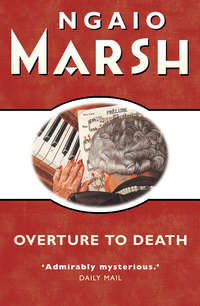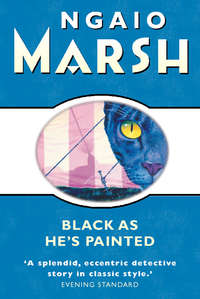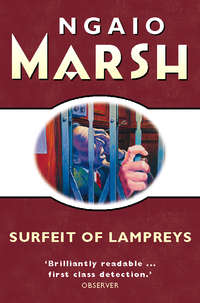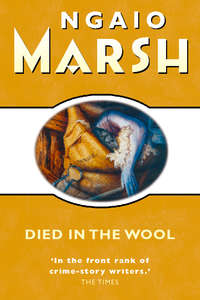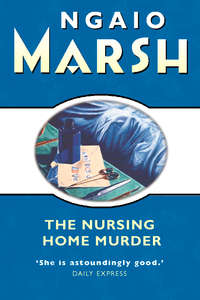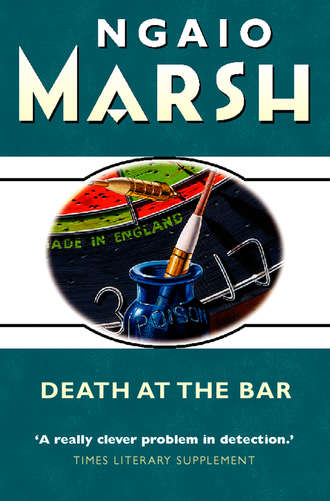
Полная версия
Death at the Bar
The next roll of thunder lasted twice as long as the others and ended in a violent tympanic rattle. Mrs Ives cleared the table and went away. Cubitt moved into the ingle-nook and leant his elbows on the mantelpiece. The room had grown darker. A flight of gulls, making for the sea, passed clamorously over the village. Watchman pulled back the curtains and leant over the window-sill. Heavy drops of rain had begun to fall. They hit the cobble-stones in the inn yard with loud slaps.
‘Here comes the rain,’ said Parish, unnecessarily.
Old Abel Pomeroy came into the Public from the far door. He began to shut the windows and called through into the Private.
‘We’m in for a black storm, souls.’
A glint of lightning flickered in the yard outside. Parish stood up scraping his chair-legs on the floor-boards.
‘They say,’ said Parish, ‘that if you count the seconds between the flash and the thunder it gives you the distance –’
A peal of thunder rolled up a steep crescendo.
‘– the distance away in fifths of a mile,’ ended Parish.
‘Do shut up, Seb,’ implored Watchman, not too unkindly.
‘Damn it all,’ said Parish. ‘I don’t know what the hell’s the matter with you. Do you, Norman?’
Abel Pomeroy came through the bar into the taproom.
‘Be colder soon, I reckon,’ he said. ‘If you’d like a fire gentlemen –’
‘We’ll light it, Abel, if we want it,’ said Cubitt.
‘Good enough, sir.’ Abel looked from Cubitt and Parish to Watchman, who still leant over the window-sill.
‘She’ll come bouncing and teeming through that window, Mr Watchman, once she do break out. Proper deluge she’ll be.’
‘All right, Abel. I’ll look after the window.’
A livid whiteness flickered outside. Cubitt and Parish had a momentary picture of Watchman, in silhouette against the background of inn-yard and houses. A second later the thunder broke in two outrageous claps. Then, in a mounting roar, the rain came down.
‘Yurr she comes,’ said Abel.
He switched on the light and crossed to the door into the passage.
‘Reckon Legge’ll bide tonight after all,’ said Abel.
Watchman spun round.
‘Is Legge going away?’ he asked.
‘He’m called away on business, sir, to Illington. But that lil’ car of his leaks like a lobster-pot. Reckon the man’d better wait till tomorrow. I must look to the gutters or us’ll have the rain coming in through upstairs ceilings.’
He went out.
The evening was now filled with the sound of rain and thunder. Watchman shut the window and came into the room. His head was wet.
He said: ‘It’s much colder. We might have that fire.’
Cubitt lit the fire and they watched the first flames rise uncertainly among the driftwood.
‘The rain’s coming down the chimney,’ said Parish. ‘Hallo! Who’s this?’
The taproom door opened slowly. There, on the threshold, stood the Hon. Violet Darragh, dripping like a soused hen. Her cotton dress was gummed to her person with such precision that it might as well have melted. Her curls were flattened into streaks, and from the brim of her hat poured little rivers that rushed together at the base of her neck, and, taking the way of least resistance, streamed centrally to her waist where they deployed and ran divergently to the floor. With one hand she held a canvas hold-all, with the other a piece of paper that still bore streaks of cobalt-blue and veridian across its pulpy surface. She might have been an illustration from one of the more Rabelaisian pages of La Vie Parisienne.
‘My dear Miss Darragh!’ ejaculated Watchman.
‘Ah, look at me!’ said Miss Darragh. ‘What a pickle I’m in, and me picture ruined. I was determined to finish it and I stayed on till the thunder and lightning drove me away in terror of me life, and when I emerged from the tunnel didn’t it break over me like the entire contents of the ocean. Well, I’ll go up now and change, for I must look a terrible old sight.’
She glanced down at herself, gasped, cast a comical glance at the three men, and bolted.
Will Pomeroy and two companions entered the Public from the street door. They wore oilskin hats and coats, and their boots squelched on the floor-boards. Will went into the bar and served out drinks. Parish leant over the private bar and gave them good-evening.
‘You seem to have caught it in the neck,’ he observed.
‘That’s right, Mr Parish,’ said Will. ‘She’s a proper masterpiece. The surface water’ll be pouring through the tunnel if she keeps going at this gait. Here you are chaps, I’m going to change.’
He went through the Private into the house, leaving a wet trail behind him. They heard him at the telephone in the passage. He had left the door open and his voice carried above the sound of the storm.
‘That you, Dessy? Dessy, this storm’s a terror. You’d better not drive that old car over tonight. Tunnel’ll be a running stream. It’s not safe.’
Watchman began to whistle under his breath. Abel returned and took Will’s place in the bar.
‘I’d walk over myself,’ Will was saying, ‘only I can’t leave father single-handed. We’ll have a crowd in, likely, with this weather.’
‘I’m going to have a drink,’ said Watchman suddenly.
‘Walk?’ said Will. ‘You’re not scared of lightning, then. Good enough, and nobody better pleased than I am. I’ll lend you a sweater and, Dessy, you’d better warn them you’ll likely stay the night. Why not? So I do, then and you’ll find it out, my dear. I’ll come a fetch along the way to meet you.’
The receiver clicked. Will stuck his head round the door.
‘Dessy’s walking over, Dad. I’ll go through the tunnel to meet her. Have you seen Bob Legge?’
‘He said he’d be up to Illington tonight, sonny.’
‘He’ll never make it. Has he left?’
‘In his room yet, I fancy.’
‘I’ll see,’ said Will. ‘I’ve told Dessy she’d better stay the night.’
‘Very welcome, I’m sure. Ask Mrs Ives to make room ready.’
‘So I will, then,’ said Will, and disappeared.
‘Walking over!’ said Abel. ‘A matter of two miles it is, from yurr to Cary Edge. Wonderful what love’ll do, gentlemen, ’baint it?’
‘Amazing,’ said Watchman. ‘Is nobody else going to drink?’
II
By eight o’clock the public tap was full and the private nearly so. Decima Moore and Will had looked in, but at the moment were closeted upstairs with Mr Legge who had apparently decided not to go to Illington. Miss Darragh came down in dry clothes with her curls rubbed up, and sat writing letters by the fire.
Two of Abel’s regular cronies had come in: Dick Oates, the Ottercombe policeman, and Arthur Gill, the grocer. A little later they were joined by Mr George Nark, an elderly bachelor-farmer whose political views chimed with those of the Left Movement, and who was therefore a favourite of Will Pomeroy’s. Mr Nark had been a great reader of the Liberal Literature of his youth, and had never got over the surprise and excitement that he had experienced thirty years ago on reading Winwood Reade, H G Wells, and the Evolution of Man. The information that he had derived from these and other serious works had, with the passage of time, become transmitted into simplified forms which though they would have astonished the authors, completely satisfied Mr Nark.
The rain still came down in torrents and Mr Nark reported the Coombe Tunnel was a running stream.
‘It’s a crying shame,’ he said, gathering the attention of the Private. ‘Bin going on for hundreds of years and no need for it. We can be flooded out three times a year and capitalistic government only laughs at us. Science would have druv a class-A highroad into the Coombe if somebody had axed it. But does a capitalistic government ax the advice of Science? Not it. It’s afraid to. And why? Because Science knows too much for it.’
‘Ah,’ said Mr Gill.
‘That’s capitalism for you,’ continued Mr Nark. ‘Blind-stupid and arrogant. Patching up where it should pitch-in and start afresh. What can you expect, my sonnies, from a parcel of wage-slaves and pampered aristocrats that don’t know the smell of a day’s work. So long as they’ve got their luxuries for themselves –’
He stopped and looked at Miss Darrah.
‘Axing your pardon, Miss,’ said Mr Nark. ‘In the heat of my discourse I got carried off my feet with the powerful rush of ideas and forgot your presence. This’ll be all gall and wormwood to you, doubtless.’
‘Not at all, Mr Nark,’ said Miss Darragh cheerfully. ‘I’m myself a poor woman, and I’ve moods when I’m consumed with jealousy for anybody who’s got a lot of money.’
This was not precisely the answer Mr Nark, who was a prosperous farmer, desired.
‘It’s the government,’ he said, ‘that does every man jack of us out of our scientific rights.’
‘As far as that goes,’ said PC Oates, ‘I reckon one government’s as scientific as the other. Look at sewage for instance.’
‘Why?’ demanded Mr Nark, ‘should we look at sewage? What’s sewage got to do with it? We’re all animals.’
‘Ah,’ said Mr Gill, ‘so we are, then.’
‘Do you know, Dick Oates,’ continued Mr Nark, ‘that you’ve got a rudimentary tail?’
‘And if I have, which I don’t admit –’
‘Ask Mr Cubitt, then. He’s an artist and no doubt has studied the skeleton of man in its present stage of evolution. The name escapes me for the moment, but we’ve all got it. Isn’t that correct, sir?’
‘Yes, yes,’ said Norman Cubitt hurriedly. ‘Quite right, Mr Nark.’
‘There you are,’ said Mr Nark. ‘Apes, every manjack of us, and our arms have only grown shorter through us knocking off the habit of hanging from limbs of trees.’
‘What about our tongues?’ asked Mr Oates.
‘Never mind about them,’ answered Mr Nark warmly, ‘do you know that an unborn child’s got gills like a fish?’
‘That doesn’t make a monkey of it, however.’
‘It goes to show, though.’
‘What?’
‘You want to educate yourself. In a proper government the State ’ud educate the police so’s they’d understand these deep matters for themselves. They know all about that in Russia. Scientific necessity that’s what it is.’
‘I don’t see how knowing I’ve got a bit of a tail and once had a pair of gills is going to get me any nearer to a sergeant’s stripe,’ reasoned Mr Oates. ‘What I’d like is a case. You know how it happens in these crime stories, chaps,’ he continued, looking round the company. ‘I read a good many of them, and it’s always the same thing. The keen young PC happens to be on the spot when there’s a homicide. His super has to call in the Yard and before you know where you are, the PC’s working with one of the Big four and getting praised for his witty deductions. All I can say is I wish it happened like that in the Illington and Ottercombe Riding. Well, I’d best go round the beat, I reckon Down the Steps and up again, is about all this drownded hole’ll see of me tonight. I’ll look in again, chaps.’
Mr Oates adjusted his helmet, fastened his mackintosh, looked to his lamp, and went out into the storm.
‘Ah, the poor fellow!’ murmured Miss Darragh comfortably from inside the ingle-nook settle.
‘In a properly conducted state –’ began Mr Nark.
His remark was drowned in a clap of thunder. The lights wavered and grew so dim that the filaments in the bulbs were reduced to luminous threads.
‘Drat they electrics,’ said old Abel. ‘That’s the storm playing bobs-a-dying with the wires somewhere. Us’ll be in darkness afore closing time, I dare say.’ And he raised his voice to a bellow.
‘Will! Oi, Will!’
Will’s voice answered from above. The lights brightened. After a minute or two, Decima and Will came downstairs and into the Private. Each carried an oil lamp.
‘Guessed what you were hollowing for,’ said Will, with a grin. ‘Here’s the lamps. We’ll put ’em on the two bars, Dessy, and matches handy. Bob Legge’s fetching the other, Dad. Ceiling in his room’s sprung a leak and the rain’s coming in pretty heavy. The man was sitting there, so lost in thought he might have drowned. I’ve fixed up a bucket to catch it, and told him to come down.’
Will stared for a second at Watchman, and added rather truculently: ‘We told Bob we missed his company in the Private, didn’t we, Dess?’
‘Yes,’ said Decima.
Watchman looked at her. She turned her back to him and said something to Will.
‘Let us by all means have Mr Legge among us,’ Watchman said. ‘I hope to beat him – all round the clock.’
And in a minute or two, Mr Legge came in with the third unlit lamp.
III
On the day following the thunderstorm, the patrons of the Plume of Feathers tried very hard to remember in some sort of order, the events of the previous evening; the events that followed Mr Legge’s entrance into the private taproom. For one reason and another their stories varied, but no doubt the principal reason for their variation might be found in the bottle of Courvoisier ’87 that Abel Pomeroy had brought up from the cellar. That was after Mr Gill had gone home, and before Mr Oates returned from a somewhat curtailed beat round the village.
It was Watchman who started the discussion on brandy. Watchman apparently had got over whatever unfriendly mood had possessed him earlier in the evening and was now as communicative as he had been silent. He began to tell legal stories and this he did very well indeed, so that in a minute or two he had the attention of both bars; the patrons of the public taproom leaning on the bar counter and trying to see into the other room. He told stories of famous murder trials, of odd witnesses, and finally of his biggest case before he took silk. He did not give the names of the defendants, only describing them as the embezzling experts of the century. He had led for the defence of one of them and had succeeded in shifting most of the blame to the other who got, he said, a swingeing big sentence. He became quite exalted over it all.
Sebastian always said that his cousin would have made an actor. He was certainly an excellent mimic. He gave a character sketch of the judge and made a living creature of the man. He described how, after the verdict, when the defendant’s house was sold up, he had bought three dozen of brandy from the cellar.
‘Courvoisier ’87,’ said Watchman. ‘A superb year.’
‘Me cousin Byronie,’ said Miss Darragh, looking round the corner of her settle, ‘had the finest cellar in County Clare, I believe. Before the disaster of course.’
Watchman started and stared at Miss Darragh in confusion.
‘Dear me, Mr Watchman,’ she said composedly, ‘what is the matter with you? Had you forgotten I was here?’
‘I – it sounds very ungallant, but I believe I had.’
‘What brandy did you say, sir?’ asked Abel, and when Watchman repeated mechanically, “Courvoisier ’87,” Abel said placidly that he believed he had three bottles in his own cellar.
‘I picked ’em up when old Lawyer Payne over to Diddlestock died and was sold up,’ said Abel. ‘Half-dozen, thurr was, and squire split ’em with me. I think that’s the name. It’s twelve month or more since I looked at ‘em.’
Watchman had already taken three glasses of Treble Extra and, although sober, was willing to be less so. Parish, suddenly flamboyant, offered to bet Abel a guinea that the brandy was not Courvoisier ’87 and on Abel shaking his head, said if it was Courvoisier ’87, damn it, they’d kill a bottle of it there and then. Abel took a candle and went off to the cellar. The three men in the public taproom went away. Will Pomeroy left the public bar and came to the private one. He had shown little interest in Watchman’s stories. Legge had gone into the ingle-nook where he remained reading a book on the Red Army in Northern China. Watchman embarked on a discussion with Cubitt on the subject of capital punishment. Soon it became a general argument with Decima, Cubitt and Parish on one side; and Watchman, dubiously supported by Mr Nark, on the other.
‘It’s a scientific necessity,’ said Mr Nark. ‘The country has to be purged. Cast out your waste material is what I say and so does Stalin.’
‘So does Hitler if it comes to that,’ said Cubitt. ‘You’re talking of massed slaughter, aren’t you?’
‘You can slaughter in a righteous manner,’ said Mr Nark, ‘and you can slaughter in an unrighteous manner. It’s all a matter of revolution. Survival of the fittest.’
‘What on earth’s that to say to it?’ asked Cubitt.
‘We’re talking about capital punishment in this country aren’t we?’ Decima asked.
Throughout the discussion, though she had launched several remarks at Watchman, she had not spoken directly to him. In each instance Watchman had answered exactly as if the conversation was between those two alone. He now cut in quickly.
‘I thought so,’ said Watchman. ‘My learned friend is a little confused.’
‘I regard it,’ Decima continued, always to Cubitt, ‘as a confession of weakness.’
‘I think it’s merely barbaric and horrible,’ said Parish.
‘Terrible,’ murmured Miss Darragh drowsily. ‘Barbarous indeed! If we can’t stop men from killing each other by any better means than killing in turn then they’ll persist in it till their dying day.’
Cubitt, with some difficulty, stifled a laugh.
‘Quite right, Miss Darragh,’ he said. ‘It’s a concession to the savage in all of us.’
‘Nonsense,’ said Watchman. ‘It’s an economic necessity.’
‘Ah,’ said Mr Nark with the air of one clutching at a straw, ‘ah, now you’re talking.’
Abel came back with a bottle in his hands.
Конец ознакомительного фрагмента.
Текст предоставлен ООО «ЛитРес».
Прочитайте эту книгу целиком, купив полную легальную версию на ЛитРес.
Безопасно оплатить книгу можно банковской картой Visa, MasterCard, Maestro, со счета мобильного телефона, с платежного терминала, в салоне МТС или Связной, через PayPal, WebMoney, Яндекс.Деньги, QIWI Кошелек, бонусными картами или другим удобным Вам способом.


